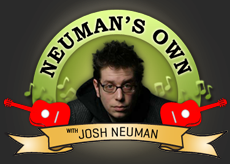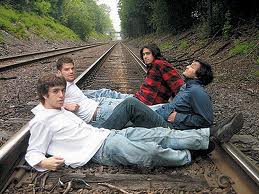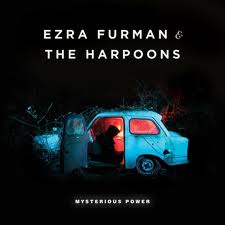Neuman's Own: The Mysterious Power Of Ezra Furman
posted in: Features • Reviews & Playlists
 After one listen to Mysterious Power (Red Parlor Records) it’s not hard to imagine twenty-four-year-old singer/songwriter Ezra Furman hopping a freight train with a bindle stick over his shoulder and a tattered copy of Thoreau in his back pocket. The recently released album, recorded with his backup band, the Harpoons, fits neatly into pantheon of the American road record. Over the course of the record, we visit New York City, Kokomo, Indiana, Colorado Springs, Boston, Chicago, the Great Plains and the Rocky Mountains. In Don’t Turn Your Back on Love he muses on an object of affection: Something about her reminds me of the United States/Sprawling across the West in all their glory. But Mysterious Power is an album that feels like it was born out of no era. Furman references 1950s doo-wop, pre-electric Dylan, The Ramones and early millennium anti-folk, but it pulsates with the energy of the mythical, and is therefore, simultaneously a tribute to the American road record, but also an implicit rebuke to its hagiography. As Furman sings in Portrait of Maud: The tumbleweeds have changed into plastic shopping bags, and the buffalo are dead and there’s nowhere left to expand”make no mistake, he has come to bury the road record, not to praise it.
After one listen to Mysterious Power (Red Parlor Records) it’s not hard to imagine twenty-four-year-old singer/songwriter Ezra Furman hopping a freight train with a bindle stick over his shoulder and a tattered copy of Thoreau in his back pocket. The recently released album, recorded with his backup band, the Harpoons, fits neatly into pantheon of the American road record. Over the course of the record, we visit New York City, Kokomo, Indiana, Colorado Springs, Boston, Chicago, the Great Plains and the Rocky Mountains. In Don’t Turn Your Back on Love he muses on an object of affection: Something about her reminds me of the United States/Sprawling across the West in all their glory. But Mysterious Power is an album that feels like it was born out of no era. Furman references 1950s doo-wop, pre-electric Dylan, The Ramones and early millennium anti-folk, but it pulsates with the energy of the mythical, and is therefore, simultaneously a tribute to the American road record, but also an implicit rebuke to its hagiography. As Furman sings in Portrait of Maud: The tumbleweeds have changed into plastic shopping bags, and the buffalo are dead and there’s nowhere left to expand”make no mistake, he has come to bury the road record, not to praise it.
If the wandering road is a conspicuous presence on Mysterious Power it’s likely because Furman wrote it during a period that he felt homeless. Furman attended Tufts University (like other notable indie acts The Physicals, Tracy Chapman and Guster), but frequently felt aimless while there. A lot of people at Tufts would tell you, ˜I’m preparing to do big things’ and I always felt like an underachiever, a little unfocused. After graduating, he moved around a lot and was robbed a couple of times”once by a random roommate who took his checkbook and tried to spend $10 at a time at Stop & Shop. When you feel like a wanderer, you build a spiritual place (hopefully) to survive. That’s what Mysterious Power is about.
Despite increasingly gaining kudos from the music cognoscenti (Paste recently called him a first-rate original storyteller), Furman can’t help but remain critical of his work”particularly his lyrics. He seeks the graceful calm and elegant simplicity of Buddy Holly and bemoans I can never keep it that clean and elegant”I’m always too nervous and trying to squeeze in too many syllables. I was listening to Sam Cooke the other day and it was just painful. Why am I not able to do this?
 Though he may be a long way from Sam Cooke, Furman has already established himself as a gifted songwriter. I believe in tone, Furman tells me. The first Dylan record I ever heard was Blonde on Blonde and it took me a long time to realize that everyone notices the words, but to me, he’s using words as fillers. It almost doesn’t matter what he says as much as the breath and tone and the way he’s speaking, which gives you a cinematic sweep. He can sound like Homer or a Romantic poet, but the point is that the rhythm of words matters more than the words themselves.
Though he may be a long way from Sam Cooke, Furman has already established himself as a gifted songwriter. I believe in tone, Furman tells me. The first Dylan record I ever heard was Blonde on Blonde and it took me a long time to realize that everyone notices the words, but to me, he’s using words as fillers. It almost doesn’t matter what he says as much as the breath and tone and the way he’s speaking, which gives you a cinematic sweep. He can sound like Homer or a Romantic poet, but the point is that the rhythm of words matters more than the words themselves.Maybe it’s unfair to ask a wandering troubadour like Furman what the future looks like to him. Half expecting him to answer, Plastics, I ask him where he’d like to be five years from now.
I have no plan, he tells me. Who knows, maybe I’ll just say, ˜I Quit. I’m Movin’ On.’
Sam Cooke couldn’t have said it better.
